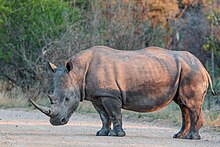rhinoceros
Jump to navigation
Jump to search
See also: rhinocéros
English[edit]

Etymology[edit]
From Latin rhīnocerōs, from Ancient Greek ῥῑνόκερως (rhīnókerōs, “nose-horned”), composed of ῥῑ́ς, ῥῑνός (rhī́s, rhīnós, “nose, of (the) nose”) + κέρας (kéras, “horn”).
Pronunciation[edit]
- (UK) enPR: rī-nŏsʹə-rəs; IPA(key): /ɹaɪˈnɒs.ə.ɹəs/
- (US, Canada) enPR: rī-nŏʹsə-rəs; IPA(key): /ɹaɪˈnɑ.sə.ɹəs/
Audio (US) (file)
- (General Australian) IPA(key): /ɹɑɪˈnɔs.ə.ɹəs/
Noun[edit]
rhinoceros (plural rhinoceros or rhinoceroses or (uncommon) rhinocerosses or (nonstandard) rhinoceri or (nonstandard) rhinoceroi or (now rare) rhinocerotes)
- Any of several large herbivorous ungulates native to Africa and Asia of the five extant species in the three extant genera in the family Rhinocerotidae, with thick, gray skin and one or two horns on their snouts.
- 1658, Thomas Brown, “Of Unicorns Horn”, in Pseudodoxia Epidemica: Or Enquiries Into Very many Received Tenents And commonly Presumed Truths. The Fourth Edition[1], page 203:
- Herein therefore to draw up our determinations beside the several pieces of Scripture mentioning this Animal (which some may well contend to be only meant of the Rhinoceros) we are so far from denying there is any Unicorn at all, that we affirme there are many kinds thereof. In the number of Quadrapedes we will concede no less then five; that is the Indian Oxe, Indian Ass, Rhinoceros, the Oryx, and that which is more eminently termed Monoceros, or Unicornis.
- (paleontology) A member of the superfamily Rhinocerotoidea, including hornless members of the extinct genus Paraceratherium.
Hyponyms[edit]
- aceratheriin (†Aceratheriinae)
- African rhinoceros
- black rhinoceros (Diceros bicornis)
- greater one-horned rhinoceros (Rhinoceros unicornis)
- Indian rhinoceros (Rhinoceros unicornis)
- Javan rhinoceros (Rhinoceros sondaicus)
- lesser one-horned rhinoceros (Rhinoceros sondaicus)
- Merck's rhinoceros (†Stephanorhinus kirchbergensis)
- narrow-nosed rhinoceros (†Stephanorhinus hemitoechus)
- one-horned rhinoceros (Rhinoceros spp.)
- square-lipped rhinoceros (Ceratotherium simum)
- Sumatran rhinoceros (Dicerorhinus sumatrensis)
- white rhinoceros (Ceratotherium simum)
- woolly rhinoceros (†Coelodonta antiquitatis)
Derived terms[edit]
- First Rhinoceros Party
- Second Rhinoceros Party
- rhino
- Rhino, Rhinos (cf. also the homophones: RINO, RINOs, Republican(s) In Name Only)
- rhinoceros auklet (Cerorhinca monocerata)
- rhinoceros beetle (Dynastinae spp.)
- rhinoceros bird (Bucerotidae spp.)
- Rhinoceros Party of Canada (French: Parti Rhinocéros du Canada) (1963–1993)
- Rhinoceros Party (French: Parti Rhinocéros)
- Rhino Party (French: Parti Rhino)
Translations[edit]
herbivorous pachyderm with horn(s)
| |||||||
See also[edit]
Latin[edit]
Etymology[edit]
From Ancient Greek ῥῑνόκερως (rhīnókerōs).
Pronunciation[edit]
- (Classical) IPA(key): /riːˈno.ke.roːs/, [riːˈnɔkɛroːs̠]
- (modern Italianate Ecclesiastical) IPA(key): /riˈno.t͡ʃe.ros/, [riˈnɔːt͡ʃeros]
Noun[edit]
rhīnocerōs m (genitive rhīnocerōtis); third declension
- A rhinoceros
- A vessel made of a rhinoceros's horn
- A nickname for someone with a long nose.
Declension[edit]
Third-declension noun.
| Case | Singular | Plural |
|---|---|---|
| Nominative | rhīnocerōs | rhīnocerōtēs |
| Genitive | rhīnocerōtis | rhīnocerōtum |
| Dative | rhīnocerōtī | rhīnocerōtibus |
| Accusative | rhīnocerōta rhīnocerōtem |
rhīnocerōtas rhīnocerōtēs |
| Ablative | rhīnocerōte | rhīnocerōtibus |
| Vocative | rhīnocerōs | rhīnocerōtēs |
References[edit]
- rhinoceros in Karl Ernst Georges, Ausführliches lateinisch-deutsches Handwörterbuch
- “rhinoceros”, in Charlton T. Lewis and Charles Short (1879) A Latin Dictionary, Oxford: Clarendon Press
- “rhinoceros”, in Charlton T. Lewis (1891) An Elementary Latin Dictionary, New York: Harper & Brothers
- rhinoceros in Gaffiot, Félix (1934) Dictionnaire illustré latin-français, Hachette.
Categories:
- English terms derived from Proto-Indo-European
- English terms derived from the Proto-Indo-European root *ḱerh₂-
- English terms derived from Latin
- English terms derived from Ancient Greek
- English 4-syllable words
- English terms with IPA pronunciation
- English terms with audio links
- English lemmas
- English nouns
- English countable nouns
- English indeclinable nouns
- English nouns with irregular plurals
- English terms with quotations
- en:Paleontology
- en:Rhinoceroses
- Latin terms borrowed from Ancient Greek
- Latin terms derived from Ancient Greek
- Latin 4-syllable words
- Latin terms with IPA pronunciation
- Latin lemmas
- Latin nouns
- Latin third declension nouns
- Latin masculine nouns in the third declension
- Latin masculine nouns
- la:Rhinoceroses
